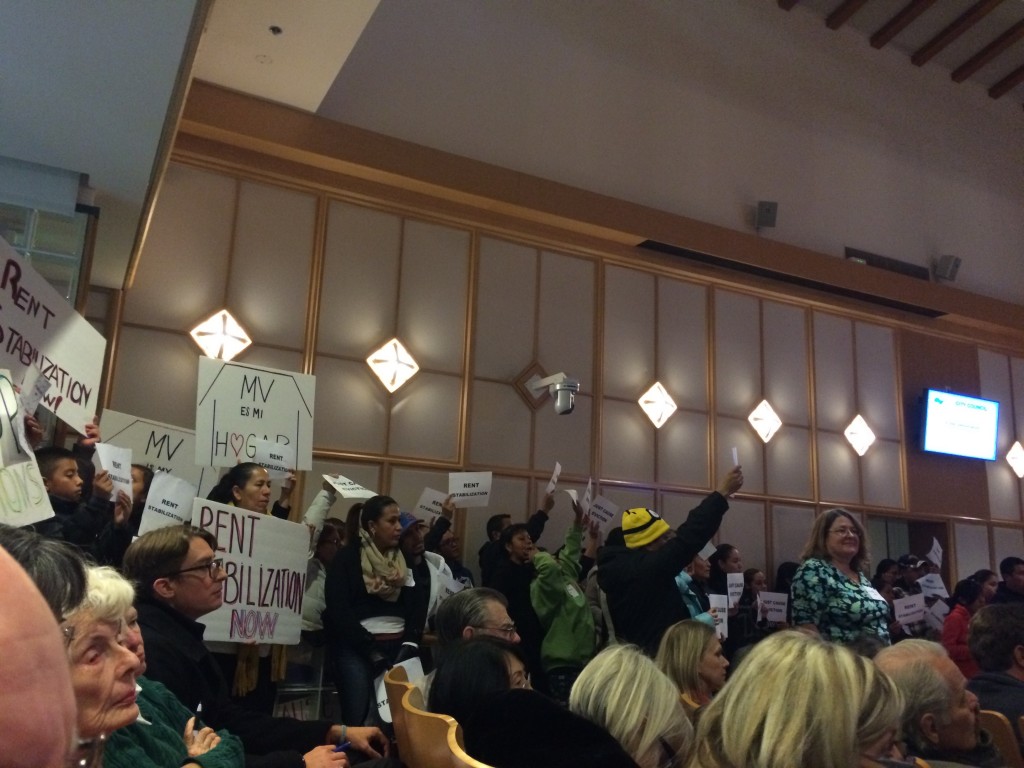The Mountain View City Council on Dec. 1 voted to expand rent subsidies for low-income households and passed a measure that will make it harder for landlords to evict tenants.
The city council voted 6-1 to more than quadruple funding for rent subsidies from $36,000 to $150,000. The subsidies will enable low-income households that receive rent increases to continue to pay pre-increase rents for four to nine months. Community Services Agency, a social services nonprofit that runs Mountain View’s existing subsidy program, will administer the new funding, which could assist over 100 clients annually.
Alternative remedies discussed could have provided larger subsidies but wouldn’t have helped as many people, councilmembers said.

Tom Myers, executive director of Community Services Agency, praised the moves. “We’re dealing with this a lot better than other communities,’ Myers said at the Dec. 1 meeting.
In a 6-1 vote, the council also passed a measure meant to make it harder for landlords to evict tenants. This “right-to-lease” ordinance will require landlords to offer six-month and one-year leases and would allow month-to-month arrangements only if tenants reject both lease offers in writing. The lease requirement will take effect on Jan. 7, but landlords have until Mar. 1 to offer the longer-term leases to tenants who currently have month-to-month leases.
There are more chances to evict tenants under month-to-month leases than under longer-term leases because protections against evictions without cause last only for the term of the lease. At the end of the lease term, a landlord may evict a tenant for any reason, as long as he provides 30 to 60 days notice.
Councilmember Lenny Siegel supported the lease requirement but doubted it would have a significant effect in today’s housing market. “I think it’s an inadequate response,” Siegel said. “But I don’t see any downside to it.”
The votes came after hundreds of residents took part in protests and turned out at council meetings throughout September and October to demand relief for tenants who report they increasingly face eviction or need to relocate amid sudden, sharp rent increases.
Rents in Mountain View rose 7.9 percent in the last year, compared to a national increase of 3.7 percent, according to real estate website Zillow. The monthly median rent in Mountain View is $4,211.
The city council also directed staff to draft an ordinance for a mandatory mediation program, which would give tenants the right to compel landlords to attend mediation when rent increases by a certain amount.
Landlord advocates opposed the potential program. Jessica Epstein, Government Affairs Director for the Silicon Valley Association of Realtors, called it “just another form of rent control.”
Tenant advocate Evan Ortiz welcomed the idea, viewing it as an opportunity to add protections against eviction. “I’d encourage council to consider eviction as a triggering event for mandatory mediation,” Ortiz said.
City attorney Jannie Quinn said staff would consult with a range of local stakeholders in drafting the mandatory mediation ordinance. According to Quinn, she will need at least until the end of January to prepare the ordinance.
